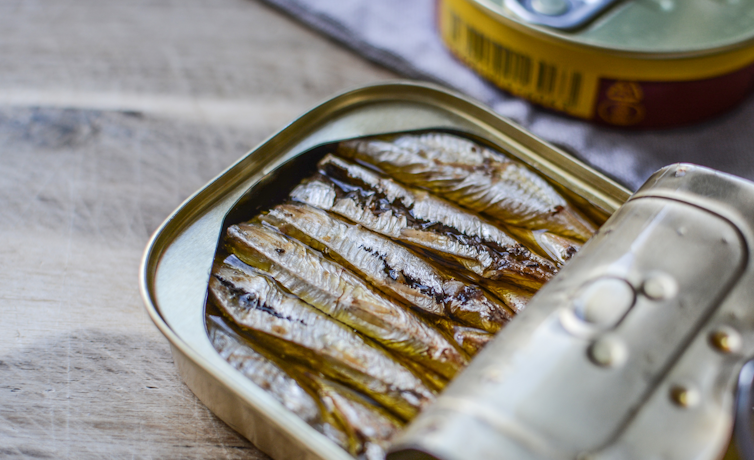Environment & Nature
Swap salmon for sardines to keep four million tonnes of fish in the sea

Cutting down on meat and dairy is one way to make your diet better for the planet. But when it comes to sustainable seafood, buying sardines instead of salmon for your sandwiches and salads should be your first port of call.
A third of fish stocks are being harvested at rates that exceed what these populations can replenish, and 90% are fished right up to their sustainable limit, according to the UN Food and Agriculture Organization. A leading cause of overfishing is, ironically, the demand for fish feed. Over one-third of all fish caught worldwide are fed to farmed animals instead of people. Fish farming, or aquaculture, is the world’s fastest growing food sector. Most of the Atlantic salmon sold in supermarkets in the UK is farmed.
Rearing these large, predatory fish involves feeding them a diet rich in omega-3 fatty acids and protein, nutrients that are also essential to humans for brain development and nerve function. In a new study, my colleagues and I found that if people ate the wild-caught fish, such as sardines, which are usually destined for salmon farms, it would leave nearly 4 million tonnes of fish in the sea and provide an extra 6 million tonnes of seafood.
Feed people, not fish farms
The sea provides humanity with a bounty of nutrient-rich food, which we have benefited from for thousands of years. Seafood is one of the most easily absorbed sources of key nutrients such as omega-3 and vitamins D and A that humans need. It is believed that a diet that included seafood may have helped humans develop bigger brains. There is a global responsibility to sustainably use this resource, as over 3.3 billion people rely on it as their source of animal protein.
Salmon raised in coastal farms off Scotland is the UK’s largest food export by total annual economic value (followed by bread and pastries). Our research team carried out a thorough assessment of the Scottish salmon industry, collecting data on fish nutrient content, fishmeal and fish oil composition and examining the transfer of micronutrients from feed to fish.
We found that by removing wild-caught fish from salmon feed and only using fish byproducts instead – such as trimmings and offcuts from the filleting of farmed fish – 3.7 million tonnes of fish could be left in the sea and global annual seafood production could increase by 6.1 million tonnes. Over half of the essential dietary minerals and fatty acids available in wild fish are currently lost to human mouths when these fish are fed to farmed salmon.
By comparing salmon with other options, our research also highlighted the health and environmental benefits of eating more sustainably farmed seafood, such as mussels. Mussels belong to the bivalve class of molluscs that include shellfish like clams and oysters (but not prawns, lobsters or crabs). Our research has shown that mussels are one of the most sustainable foods on the planet, more so than any other meat, fish, and most land-based crops like soya, wheat and rice.
Mussels require no feed, they simply eat algae in the water. The reefs they create act as nurseries where young fish can develop to full size, helping to regenerate wild fish stocks. Bivalve farms use up no land and no freshwater. They actually act as a carbon sink.
But what if you like eating salmon? The use of alternative feeds in salmon farms is growing, but some are better than others. Feeds made from crops like soya and corn need a lot of land and water to produce, but those made using algae are richer in omega-3 and use up sea space (of which there is plenty) instead of land. We need more research and investment to produce nutritious seafood while reducing pressure on marine ecosystems.
If you’re ever unsure, there are two simple mnemonics to guide what fish you should buy:
ECOME – Eat clams, oysters and mussels everywhere
SMASH – Sardines, mackerel, anchovies, sprats and herring
So enjoy your moules frites and barbecued sardines. Eat small, oily fish and bivalve shellfish. Eating more of these tasty foods, and foregoing the salmon and tinned tuna, can make a real difference to the ocean.
David Willer, Henslow Research Fellow, Sustainable Seafood, University of Cambridge
This article is republished from The Conversation under a Creative Commons license. Read the original article.





















